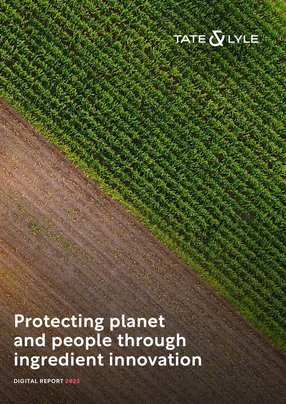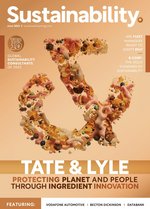Protecting planet and people through ingredient innovation
The global food industry is facing an inflection point. With the climate crisis knocking at our door, we all need to do things differently.
Food and drink producers understand that they need to partner with their supply chains to minimise their environmental impact and build climate resilience. Leaders in the industry are focused on strengthening sustainable sourcing practices while adopting innovative approaches to production, packaging, refrigeration and transportation. No company can do this alone.
Building sustainability into their research and development through the creation of plant-based products is another core focus for industry leaders. The United Nations has found that plant-based foods generally use less energy, land and water, and have lower greenhouse gas intensities than animal-based foods.1
At Tate & Lyle, we’re supporting our food and beverage customers as they assess their position in the plant-based movement. In this article series, we look at some of the trends we see in these areas and the science-driven solutions our global teams are helping to provide to society’s biggest challenge: the climate crisis.
Sustainable sourcing is a business obligation
Tate & Lyle's Director of Sustainability Anna Pierce on partnering to drive positive impact through support for regenerative agriculture
Why is responsible ingredient sourcing so important for food and drink businesses? As companies assess and start reporting on their carbon footprint, they realise that most of their emissions come from their supply chain. That presents a real challenge, even for leading industry players: how to mitigate climate change outside of their factory gates, and how to access reliable data and insights to inform business decisions and satisfy stakeholders, today and tomorrow.
All companies need to provide a level of transparency and Tate & Lyle knows this trend, and its associated complex and ever-changing requirements, is here to stay. The company believe that ingredient suppliers have a special opportunity to help producers with impact visibility, such as product carbon footprint data, and to support the cultivation of sustainably -grown raw materials for what later become the food products that we see on the shelf.
First step: understanding individual and shared goals
While demonstrating positive environmental impact is expected by governing bodies and investors, businesses increasingly want to share their sustainability progress as a matter of reputational differentiation and overall commitment to responsible sourcing, operations, innovation and growth.
Tate & Lyle’s Director of Sustainability Anna Pierce advocates a united process for moving forward.
“Tate & Lyle connects farmers, who are ultimately the suppliers of all our food and drink, and consumer goods companies that are working to formulate sustainability programmes and collective goals to drive real change,” says Pierce.
“Our role is to work with farmers to understand which agricultural practice changes will make the biggest impact environmentally while providing a more positive return on their investment so that everyone moves forward collectively.”
Aligning views: Why care about sustainable sourcing?
Pierce sees organisations’ own ambitions to reduce and eventually eliminate their impacts as being aligned with those who consume their goods.
“Consumers have indicated that they’re more interested in sustainable products. Investors, employees and future talent also want to see clear evidence that businesses are acting in society’s best interests.”
“Investors especially want to be assured that companies are strengthening resilience to climate change and that it’s part of the planning and risk assessment process. Ultimately, I believe the companies that most value sustainability will be successful, but everyone needs to act with urgency to mitigate the worst effects of climate change,” Pierce explains.
With motivations clearly aligned, how can companies communicate what they’re doing? As reporting standards and metrics vary greatly, Pierce believes certification through respected schemes and transparent ESG reporting must be leveraged until a unified approach to disclosures is developed, and it isn’t on the horizon.
“In some cases, companies make use of on-pack certification like Fairtrade or Rainforest Alliance where consumers have a level of trust if only a vague understanding of what it represents,” says Pierce.
“Everyone has their own take on what counts as ‘sustainable’. .I see this as an opportunity to come together and collectively agree on what responsible sourcing looks like so we and our customers can help consumers understand it.”
For its part, Tate & Lyle approaches responsible sourcing through its programmes in the US and China. The company has enrolled the equivalent of 100% of the corn it uses annually in a sustainable agriculture programme developed with Truterra, LLC in 2018. Through the programme, now led by Primient, Tate & Lyle helps its customers advance the adoption of regenerative farming practices that restore soil health and gain insight into the impact they are helping to drive.
Working with environmental charity Earthwatch Europe and Nanjing Agricultural University in eastern China, the company supports growers of stevia, used to make the leading plant-based sweetener on the market, to reduce their environmental impact while reaping productivity and economic gains. “Through our farmer partnerships, we use science and technology to demonstrate that more sustainable and regenerative practices that restore soil health are good for the planet AND the farmer.”
This new way of connecting those working on the farm to those creating the food we eat presents a big opportunity: healthier, more productive land, food brands demonstrating positive change, and a chance to capture carbon while reducing emissions.
Find out more about Tate & Lyle’s approach to sustainable agriculture at Sustainable Agriculture | Tate & Lyle (tateandlyle.com
The plant-based trend through a health lens
Kavita Karnik, Global Head of Nutrition and Regulatory at Tate & Lyle
Making a food or drink that is plant-based is a way of making it healthier but, importantly, plant-based foods are not more nutritious than those containing animal-derived ingredients by default. That is determined by the salt, sugar, fat, calorie and micronutrient content.
What can be done to enable plant-based food and drink to not only look and taste like their traditional counterpart but to also be as or more nutritious?
Understanding different purchase drivers
When the term ‘flexitarian’ was first coined in the 1990s, the focus was on enabling consumers to access the purported health benefits of a vegetarian diet without cutting out favourite foods entirely. That trend has increased in recent years, especially around the pandemic, with people viewing diet as a controllable modifier of health, in parallel with growing awareness of climate change and our diet’s contribution. When developing plant-based products, understanding the consumer drivers is key. The perceived impact on health is an important one. Manufacturers are keen to develop nutritious plant-based products, even when the product is formulated to cater to other drivers, such as growing concern around climate change. With the right nutrition and formulation know-how during development, solutions that support healthy living can be found.
Pushing nutrition up the priority list
People following flexitarian, vegetarian or vegan diets tend to pay greater attention to the ingredients in the products they buy than the average consumer, which is one of the motivators for producers aiming to incorporate recognisable ingredients. For consumers, these choices don’t always represent a healthier choice. Coconut-derived ingredients, for instance, have a “”health halo” but are typically higher in saturated fat than their animal-based counterparts, even cream. Involving nutrition experts in the formulation of products is crucial to ensuring the final food or drink provides benefits beyond superficial label attributes.
Taking steps to match nutrition
Understanding the nutritional roles that animal protein plays in a recipe is the starting point in finding its replacement. For instance, milk protein, like whey, is of very high quality, which is one of the reasons why most national health agencies still advocate its role in a healthy, balanced diet. When product developers and marketeers work with nutritionists to understand the intended consumer and their health goals, they can better account for their needs and preferences in the final formulation. Considerations such as the digestibility of plant-based protein and amino acid composition will be important for foods intended for children or older adults. Helpfully, the range and availability of protein alternatives – soy, grain, vegetable/ plant or single-cell (fungi or algae)-based - has improved significantly in recent years.
Finding opportunities to boost nutrition
For the plant-based sector, we have an opportunity to introduce nutritional benefits consumers wouldn’t usually find in traditional products, and which the target audience would welcome. Plant-based ingredients can also contain bioactive materials in higher quantities than animal-derived equivalents, such as flavonoids, phenolic acids, and saponins, which emerging science is showing can have anti-inflammatory and other beneficial properties.
Tate & Lyle’s nutrition and formulation experts are here to help future-focused brands grasp the opportunity to create new products for a healthier population and a healthy planet.
Visit Tate & Lyle Nutrition Centre for more information
Plant-based products present long-term sustainable commercial opportunities
Shen Siung Wong, Director of Global Applications at Tate & Lyle, enlightens us on the development of the plant-based sector
Age-old plant-based diets are being reimagined as the focus of the environmental impact of the food we eat has increased, with the consumer plant-based trend becoming a major component of the climate conversation.
Brands are attuned to the needs and preferences of their consumers, and they want exceptional plant-based products on the shelf to support their evolving lifestyles. However, fundamentally, consumers are looking to have their basic needs met from a food quality perspective, such as the taste, ‘mouthfeel’, and nutritional value of a product.
The challenge that brands take on to meet these demands is also in part driven by global shortages of animal-derived commodities exacerbated by events like COVID-19 and the supply chain disruptions that followed, as well as the need for affordability in inflationary economies.
So, companies are looking to innovate while meeting the needs of consumers and managing costs, which is where Tate & Lyle supports customers in their efforts. Through its research and development, it helps businesses navigate the plant-based trend, while becoming more resilient to global supply chain shifts.
“With spiralling inflation hitting many economies worldwide, cost optimisation projects with customers are increasing as brands try to minimise price increases for consumers. There are also availability challenges, such as the low supply of eggs caused by avian flu in countries ranging from the US and UK to France and Japan. Often a plant-based ingredient solution can meet consumers’ expectations at a lower cost while still delivering an extraordinary end-product,” says Shen Siung Wong, Director of Global Applications at Tate & Lyle.
“For the plant-based sector, the focus now needs to be on brand differentiation, perfecting those sensory attributes, and enhancing nutrition to encourage more regular consumption. We at Tate & Lyle are well-placed to support these endeavours, both technically and by providing more sustainably produced ingredients such as our CLARIA® Clean Label Functional Starches, which we will soon produce with a third less carbon and water than our original product line.”
Working with food and beverage brands, Tate & Lyle can make plant-based a reality, from a baked camembert alternative using its corn-based texturants made in its Customer Innovation and Collaboration Centre in Germany to vegan muffins using chickpea flour in its US lab. Chickpea flour, for instance, is gluten-free and recognisable to consumers while offering many functional benefits when used as an egg replacement such as providing similar muffin volume and peak height.
Through extensive research and trials, animal-based proteins, fats and ingredients such as eggs and gelatines can be replaced with Tate & Lyle’s plant-based ingredient solutions while providing the same aesthetics and mouthfeel of traditional products.
“Dairy is a hugely active category in the plant-based space. Cow’s milk provides the perfect composition to make yoghurt, cream, and other indulgent dairy products, and so with plant-based alternatives, we need to balance the key components—water, vegetable fats, and proteins — to replicate the texture, taste and eating experience that people love,” says Wong.
In this instance, Tate & Lyle is helping brands produce dairy alternatives, incorporating ingredients that replicate functionalities that would otherwise be addressed during the various production processes.
“The luxurious, smooth viscosity of a yoghurt, for instance, is induced by the pH dropping when the live and active cultures in milk proteins convert pasteurised milk to yoghurt during fermentation,” says Wong.
“In a plant-based alternative, we need to reproduce that texture, which we can do through our portfolio of corn and tapioca starches, including clean label options, often as part of a broader solution using stabilisers and a combination of plant-based proteins to provide equivalent nutrition.”
One of the main challenges in this process is meeting growing expectations around ‘clean-label’, the preference for recognisable ingredients and short ingredient lists. Currently, Tate & Lyle’s global team of food scientists see brands prioritising taste and texture, which go hand in hand, to secure the repeat purchase, but increasingly they are helping to develop these products with appealing nutrition and clean-label credentials. “Ticking all of these boxes won’t happen overnight, but the pace of innovation in this sector is phenomenal,” says Wong.
For the most sustainability-minded food and drink brands Tate & Lyle works with, plant-based is a reality, not a trend.
“As it continues to expand and eventually shifts from niche to mainstream, with the corresponding economies of scale benefits, R&D professionals will know they are not only making tastier, healthier, and more sustainable products, but they are helping to drive the radical transformation the industry needs to be fit for the future.”
Find out more about the plant-based trend at Trends & Insights | Tate & Lyle (tateandlyle.com






